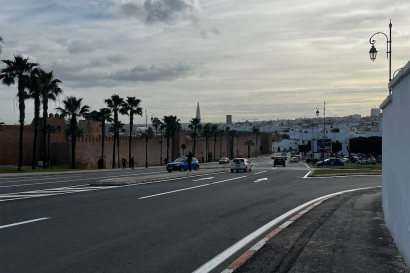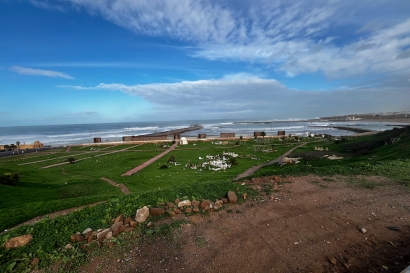Many study abroad guides for American students encourage us to reflect on our “privilege” prior to leaving. However, the concept of “privilege” doesn’t go deep enough, as it uproots individual people from the historical contexts that brought them to where they are today. I find history to be exceedingly important in my understanding of the world. Additionally, as a white American student writing about a country and cultural context that is not my own, I felt an obligation to learn more about the relationship between the West and Morocco, and the implications this has for me as a traveler. Thus, as part of my preparation for the upcoming semester, I’ve spent some time researching Morocco’s history.
Although you won’t find it discussed on travel websites, there is a profound history of slavery in Morocco that has lingering repercussions for Moroccan society today. Most enslaved people in Morocco were Black Africans forcibly brought into North Africa through the trans-Saharan slave trade.1 There is also a history of French colonialism in Morocco. These two institutions work together to reinforce ideas of white supremacy and Western superiority. They create a narrative that American/European, Christian, white values are inherently superior and that the people and cultures of the Middle East and North Africa are inferior.
Many times, travelers from Europe and the United States help to uphold these ideas through their writing and depictions of non-Western countries. Edward Said describes this process and set of colonialist attitudes as “Orientalism,”2 a term that has been adopted (and contested) by many scholars. White American writer Edith Wharton, for example, published her highly influential book In Morocco about her travels to the country after the first world war. In this travelogue, she consistently justifies French colonialism and uses language that paints Moroccans as less “civilized.” Additionally, Wharton uses anti-Black stereotypes to characterize and dehumanize Black Moroccans.3 Thus, although she was a woman, she occupied a position of relative power and used it to maintain harmful narratives about Morocco.
As a white woman writer, I find it important to reflect on the work of Edith Wharton and others like her. In many ways, my voice is given more legitimacy than others’ voices, even those who know far more than I do. Avoiding paternalistic language when describing different cultural norms or attitudes should be an important part of my writing process. I must acknowledge that my posts about my experiences in Morocco will not be representations of an objective “reality” about the people or places I interact with. Instead, they are filtered through my upbringing and cultural lenses that have always placed the U.S., whiteness, and English as cultural norms. My presence in Morocco (or anywhere) is not neutral or apolitical.
With these things in mind, I am looking forward to the semester and sharing my perspectives.
1. Becker, Cynthia. (2002). ‘We are real slaves, real Ismkhan’: Memories of the trans‐Saharan slave trade in the Tafilalet of South‐Eastern Morocco. The Journal of North African Studies, 7(4), 97-121.
2. Said, Edward. (1978). Orientalism (1st ed.). New York: Pantheon Books.
3. Simour, Lhoussain. (2009). The White Lady Travels: Narrating Fez and Spacing Colonial Authority in Edith Wharton's In Morocco. Hawwa, 7(1), 39-56.

Maddy Lowry
I'm a senior at Tulane University majoring in Africana Studies and Linguistics with a minor in Arabic, and I am very involved in student activism. I am a member of Students Organizing Against Racism, Students for Justice in Palestine, and Sexual Aggression Peer Hotline and Education, and I am committed to making Tulane's campus environment supportive and equitable for everyone. I am also a queer student and consider myself part of the LBGTQ+ community on campus.





